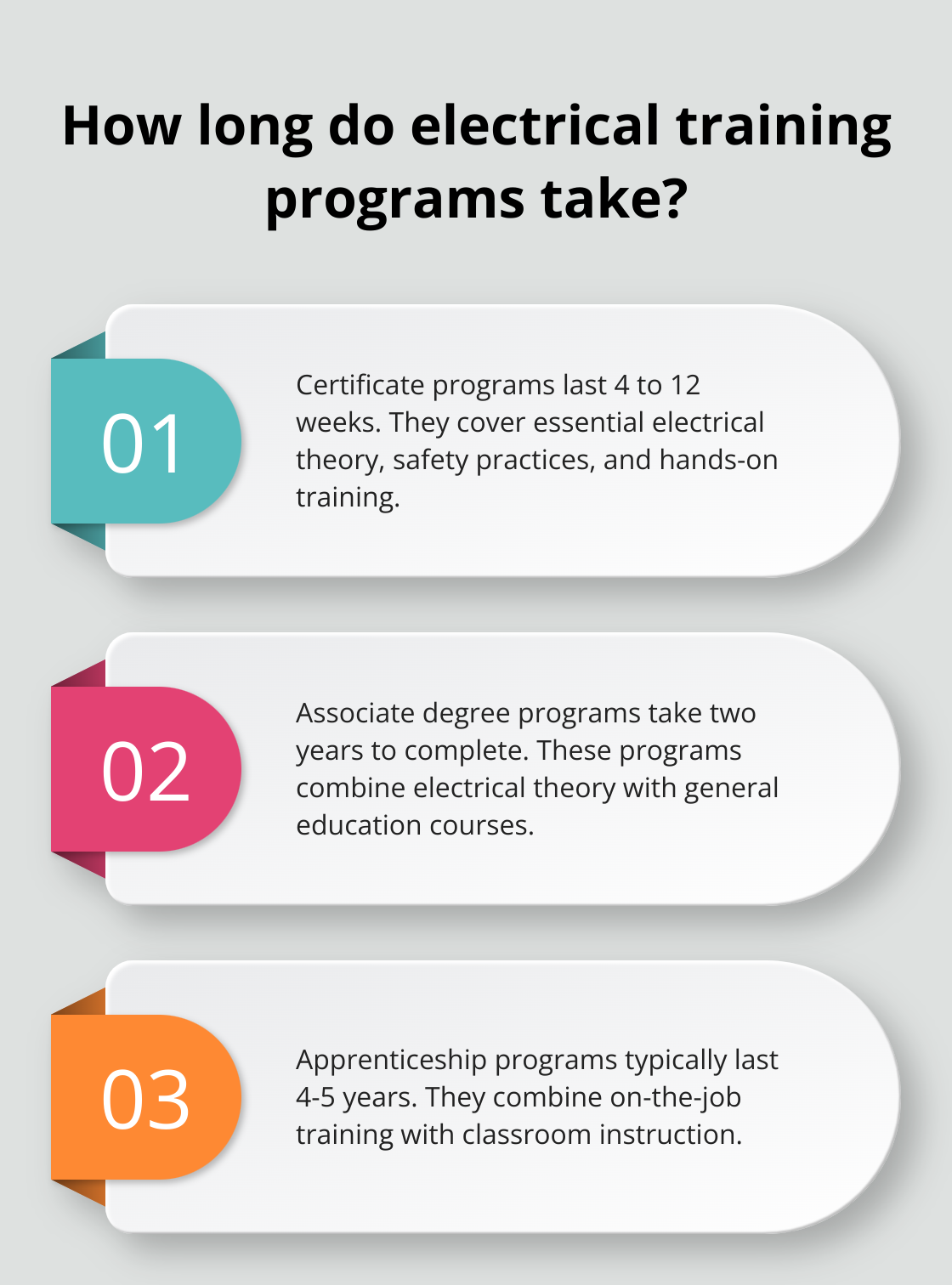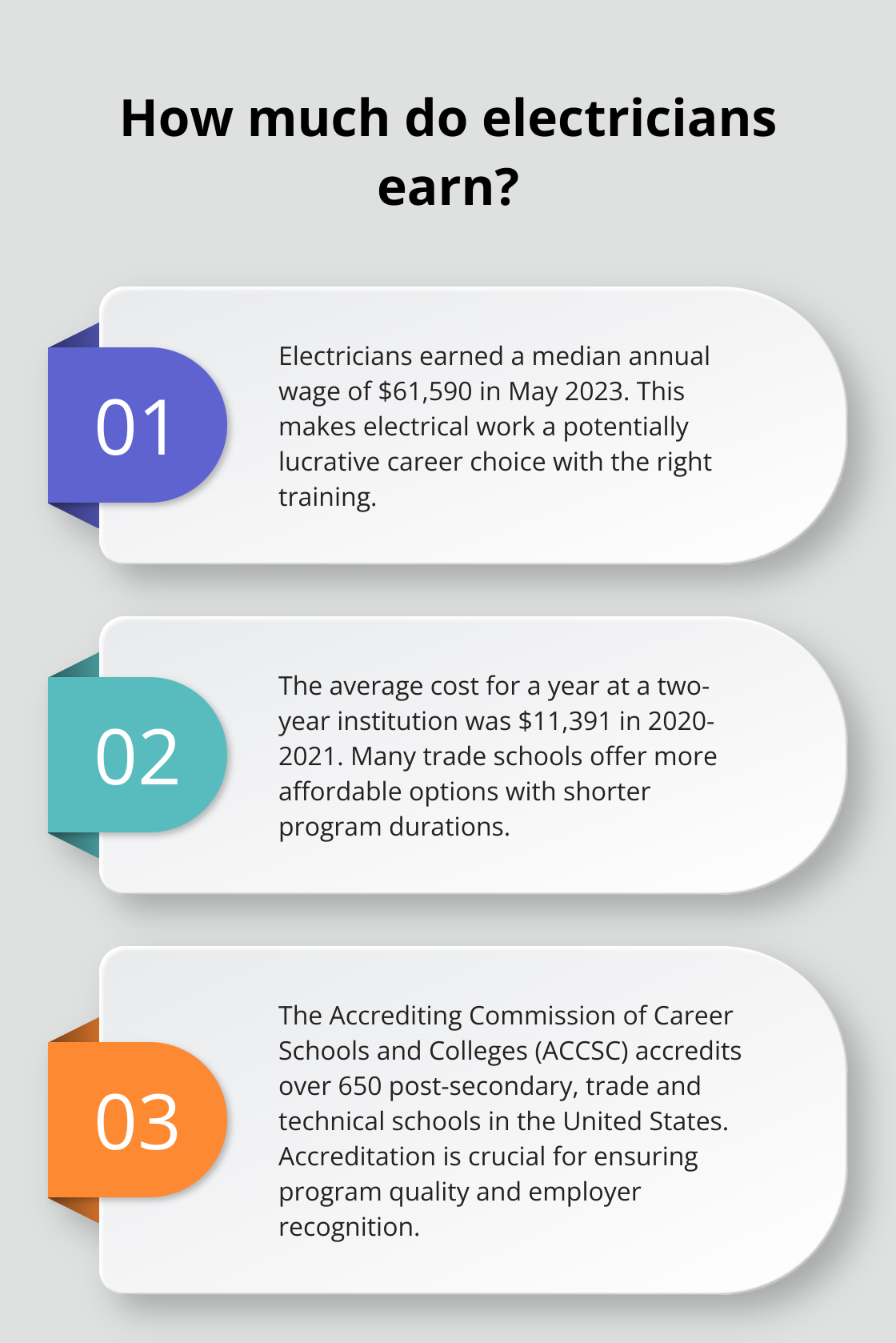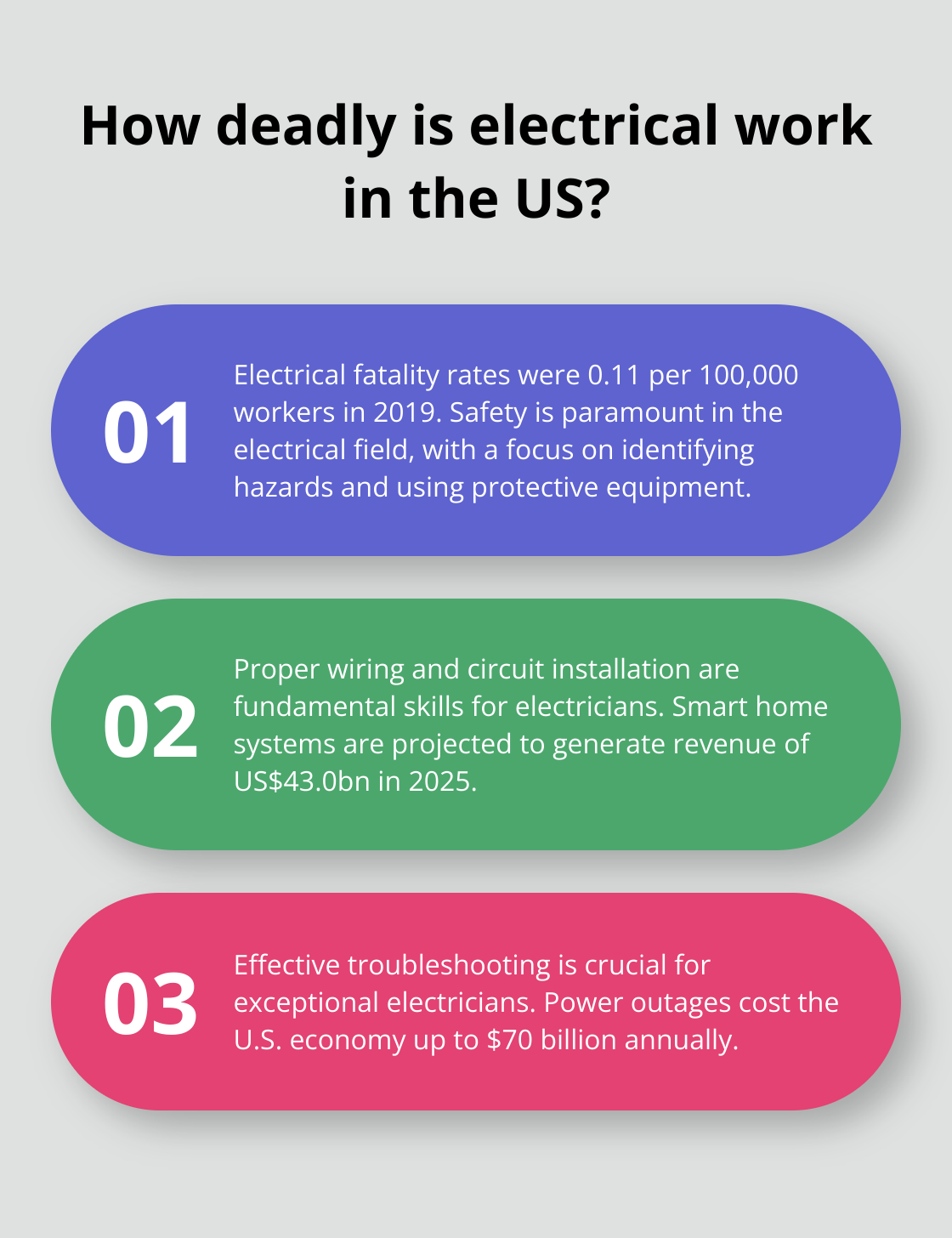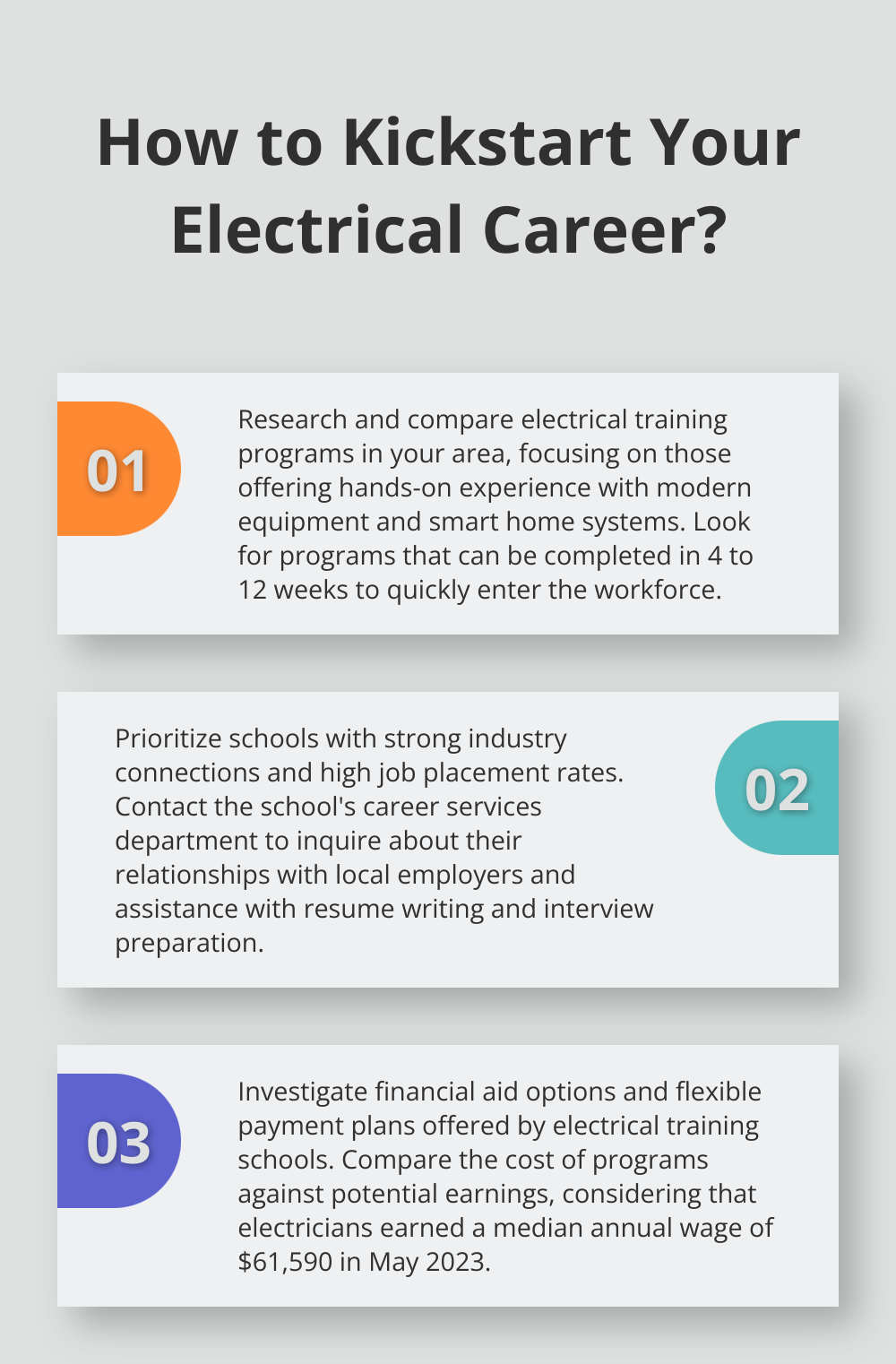At Iowa Trade School, we understand the importance of finding the right electrical training program for your career goals.
Electrical training schools offer a variety of options, from certificate programs to apprenticeships, each designed to equip you with essential skills and knowledge.
In this post, we’ll explore the different types of electrical training programs available and provide guidance on choosing the best fit for your needs.
Types of Electrical Training Programs
At Iowa Trade School, we offer various electrical training programs to match different career goals and learning styles. Let’s explore the main types of programs available in the electrical field.
Certificate Programs
Certificate programs are short-term, focused courses that typically last 4 to 12 weeks. These programs suit those who want to enter the workforce quickly or acquire specific skills. They cover essential electrical theory, safety practices, and hands-on training. Certificate programs often cost less than longer-term options and can jumpstart your electrical career.
Associate Degree Programs
Associate degree programs in electrical technology usually take two years to complete. These programs provide a more comprehensive education, combining electrical theory with general education courses. Students acquire in-depth knowledge of electrical systems, circuitry, and industry regulations. The median annual wage for electricians was $61,590 in May 2023, according to the Bureau of Labor Statistics.
Apprenticeship Programs
Apprenticeships offer a traditional path into the electrical trade, combining on-the-job training with classroom instruction. These programs typically last 4-5 years and are often sponsored by unions or electrical contractors. Apprentices earn while they learn, gradually increasing their skills and pay.
Specialized Certifications
For those who want to advance their careers or specialize in specific areas, various certifications are available. These include certifications in renewable energy systems, industrial controls, or fiber optics. The National Center for Construction Education and Research (NCCER) offers several electrical certifications that the industry widely recognizes.

Iowa Trade School prides itself on offering flexible, industry-aligned programs that cater to various learning needs. Our experienced instructors and state-of-the-art facilities ensure you receive top-quality education, regardless of the program you choose. We also provide career support services and job placement assistance to help you transition smoothly into your new electrical career.
Now that we’ve covered the types of electrical training programs, let’s move on to how you can choose the right electrical training school for your needs.
How to Select the Best Electrical Training School
Accreditation: Your Quality Assurance
When you choose an electrical training school, accreditation should top your list of priorities. Accredited programs meet industry standards and produce certifications that employers value. The Accrediting Commission of Career Schools and Colleges (ACCSC) stands out as a primary accrediting body for over 650 post-secondary, trade and technical schools in the United States. Always check a school’s accreditation status before you enroll.
Hands-on Experience: The Key to Job Readiness
Programs that offer extensive hands-on training will give you an edge in the job market. While theoretical knowledge forms a foundation, practical experience sets you apart. Look for schools that allow you to work with real electrical systems and equipment. This approach ensures you’ll hit the ground running in your new career.
Career Support: Your Bridge to Employment
A top-notch electrical training school should offer robust career services. These services often include resume writing assistance, interview preparation, and job placement support. Strong relationships with local employers can help graduates find jobs quickly. Ask about the school’s job placement rates and employer connections before you make your decision.
Cost Considerations: Balancing Value and Affordability
Evaluate the program’s cost and available financial aid options. The National Center for Education Statistics reports that the average cost for a year at a two-year institution was $11,391 in 2020-2021. However, many trade schools offer more affordable options with shorter program durations. Look for schools that provide flexible payment plans, scholarships, or partnerships with local employers for tuition assistance.

The cheapest program isn’t always the best value. Consider the quality of education, job placement rates, and potential earnings after graduation. The Bureau of Labor Statistics reports that electricians earned a median annual wage of $61,590 in May 2023, making it a potentially lucrative career choice with the right training.
Program Duration and Flexibility
Consider how the program’s duration and schedule align with your needs. Some students prefer intensive, short-term programs that get them into the workforce quickly. Others might need more flexible options that allow them to balance work or family commitments. Iowa Trade School, for example, offers programs that can be completed in as little as 4 to 12 weeks, catering to those who want to enter the workforce rapidly.
As you weigh these factors, you’ll find that the right electrical training school can significantly impact your career trajectory. The next section will explore the key skills and knowledge you’ll gain during your electrical training, preparing you for a successful career in this dynamic field.
Essential Skills for Electrical Professionals
At Iowa Trade School, we focus on equipping our students with practical, job-ready skills that are in high demand in the electrical industry. Our curriculum provides a solid foundation in electrical theory while emphasizing hands-on experience that translates directly to the job site.
Electrical Safety Mastery
Safety is paramount in the electrical field. We teach our students to identify potential hazards, use personal protective equipment correctly, and follow proper lockout/tagout procedures. Electrical fatality rates were 0.11 fatalities per 100,000 workers in 2019. We aim to keep our students safe by instilling a safety-first mindset from the start.
Wiring and Circuit Installation Expertise
Proper wiring and circuit installation are fundamental skills for any electrician. Our students learn to read and interpret electrical blueprints, select appropriate materials, and install various types of electrical systems. We use industry-standard tools and equipment in our training, ensuring familiarity with job site equipment. Students work with modern smart home systems, which are projected to generate revenue of US$43.0bn in 2025.
Professional Troubleshooting
Effective troubleshooting distinguishes exceptional electricians. We teach systematic approaches to diagnose and resolve electrical issues. Students learn to use multimeters, oscilloscopes, and other diagnostic tools to pinpoint problems quickly. This skill is vital, as power outages cost the U.S. economy up to $70 billion annually (U.S. Department of Energy).
Code Compliance Navigation
Understanding and adhering to electrical codes is essential in this field. Our program covers the National Electrical Code (NEC) in depth, ensuring students are well-versed in current regulations. We keep our curriculum updated with the latest code changes (which typically occur every three years). This knowledge prevents failed inspections, costly rework, and potential safety hazards.
Practical Experience Application
We don’t just teach theory – we provide practical, hands-on experience that prepares students for real-world scenarios. Our instructors bring years of field experience to the classroom, sharing insights that go beyond textbook knowledge. Students complete our program with the skills and confidence to tackle a wide range of electrical projects.

Final Thoughts
Electrical training schools offer diverse programs to suit various career goals and learning styles. From short-term certificates to comprehensive associate degrees and apprenticeships, aspiring electricians have multiple paths to enter this dynamic field. Specialized certifications allow professionals to enhance their skills and stay competitive in the job market.

The career outlook for electricians remains strong, with a projected job growth rate of 8% from 2019 to 2029 (according to the Bureau of Labor Statistics). This growth, coupled with competitive salaries, makes electrical work an attractive career option. As technology advances and renewable energy sources become more prevalent, the demand for skilled electricians continues to rise.
Iowa Trade School provides fast-track, hands-on training programs that prepare you for a successful career in the electrical field. Our industry-aligned curriculum, experienced instructors, and career support services ensure you’re job-ready in as little as 4 to 12 weeks. With affordable financial aid options and flexible payment plans, we make it easier for you to achieve your career goals in the electrical trade.
